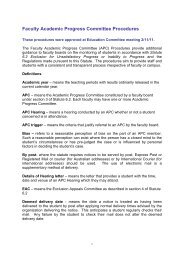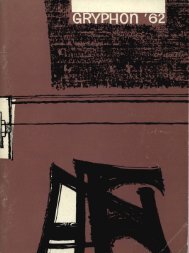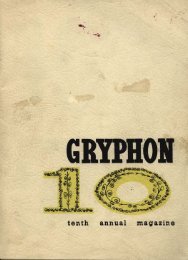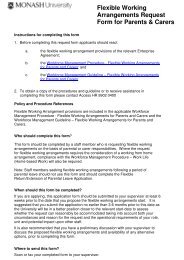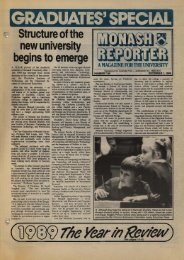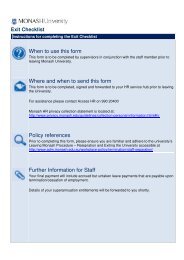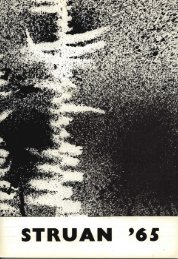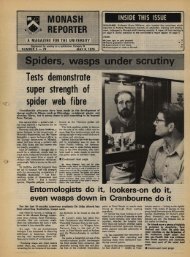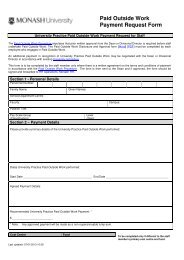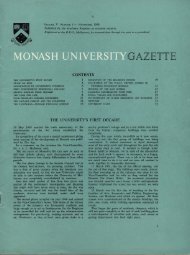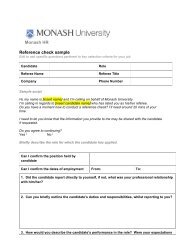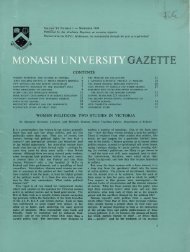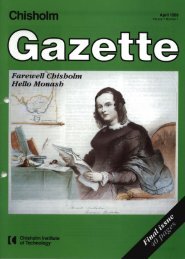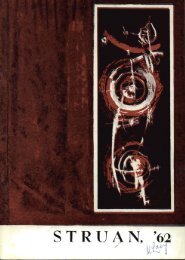Photocopying: changes coming Photocopying over the last decade or 80 hascome to play an increasingly .Ignlficant role onthe <strong>edu</strong>cation scene with photocopied materialbeing uaed widely for private .tudy and In thecla8sroom.Needless to say it is a phenomenon that has notescaped the attention of <strong>au</strong>thors, publisherS andother owners of copyright.In 1976 the Franki Committee - known officiallyas the Copyright Law Committee on ReprographicReproduction - inquired into and maderecommendations on the photocopying of copyrigbtworks, The Committee's recommendations havebeen generally implemented in the CopyrightAmendment Act 1980.When certain provisions of this Act come intooperation later this year - after users have had timeto study how the new system will work - the face of'photocopying in <strong>edu</strong>cational institutions is set tochange.A new book by Mr James Lahore. formerly a. Reader in Law at <strong>Monash</strong>, provides basic practicalinformation on the new photocopying proc<strong>edu</strong>resrequired by the Act for people who will have toobserve them - librarians, teachers, students,lawyers and othOl persons who need ready access toinformation and the efficient dissemination of thatinformation for the use of others,The book is Photocopying: A GuIde to the 1980Amendment. to the Copyright Act, published byButterwortlJ8. Mr Lahore late last year wasappointed the first Herchel Smith Professor of IntellectualProperty Law at Queen Mary College in the<strong>University</strong> of London.Mr Lahore describes as the "cornerstone" of thenew amendments provisions which relate tomultiple copying of works under statutory licence by<strong>edu</strong>cation!,1 institutions. This provision is designedto permit the multiple copying of the whole or partr.f articles and other works by <strong>edu</strong>cationalinstitutions for teaching purposes, subject to certainlimitations, provided that an equitableremuneration is paid to the copyright owner.It calls for new administrative proc<strong>edu</strong>res in<strong>edu</strong>cational institutions related to the compilationof detailed records in ca ... where multiple copying isdone for teaching purposes. These records must beheld and made available for inspection during aprescribed period.If requested, an equitable remuneration must bepaid to the copyright owner of works copied. Thissum is either agreed upon by the owner and the<strong>edu</strong>cational institution or determined by theCopyright Tribunal.Planning by institutions to meet the demand. ofthe new legislation at this stage can only be limitedbec<strong>au</strong>se certain regulations associated with it havenot yet been made.At <strong>Monash</strong>, however, the Library is currentlyMIrt.,.,• •Physics mVltes labs use• "Photocopying: A Guide to the 1980Amendments to the Copyright Act" has arecommended retail price of $4.95.conducting for the Vice-Chancellor a survey to es·tablish the extent of multiple copying for teachingpurposes in the <strong>University</strong>.The <strong>University</strong> Librarian, Mr Brian Southwell.says that it is anticipated that the photocopyingprovisions of the Act will come into force in thesecond half of this year by which time proc<strong>edu</strong>res forcomplying with them should be generally known.Action to meet the requirements of the Act will beof utmost importance for <strong>edu</strong>cational institutions.Under it, failure to comply with the administrativeproc<strong>edu</strong>res related to multiple copying is a criminaloffence punishable, upon conviction, in some casesby a fine up to $500.Failure by libraries and archives to keep recordson copying for other specified purposes - evenwhere no remuneration is due to the copyright owner- can carry a penalty of up to $500 also.Fines 'worst feeture'Mr Lahore describes thi. a8 one of the worstfeatures of the legislation."One can understand why a criminal sanction isconsidered to be a more effective way of enforcingcompliance with the proc<strong>edu</strong>res of the Act ratherthan the threat of possible copyright infringementproceedings at some future time/' he says."However, the imposition of criminal liability onbodies administering institutions and on employeesof those institutions to secure proper record keepingplaces a heavy and unjustifiable burden on those institutions,"Mr Lahore has other sharp criticisms of the Act:"It is prolix, complex, and difficult to understand.."The Act is intended to provide a system ofphotocopying for users generally, for libraries, forschools, universities and other <strong>edu</strong>cationalinstitutions and for handicapped'readers, and at thesame time to give a fair payment to the copyrightowner."The system must be easily manageable and 'clearly understood by the many people employed inthese institutions who will have to use it and bythose who want to receive payment for what iscopied."Unfortunately the Act requires many confusingproc<strong>edu</strong>res. It is doubtful whether any person couldunderstand how the system works other than by along and detailed study of the 1980 Act."Mr Lahore says that one of the reasons for thecomplexity of the legislation is the basic principleadopted by it. That is payment according to use ofcopyright materials - thus neceositating detailedrecord keeping and inspection proc<strong>edu</strong>res - ratherthan, say, payment by means of a blanket licensingscheme."Whether an alternative system will have to be usedcan only be answered after experience of the systemnow adopted. It will be an interesting exercise, ncomments Mr Lahore.Mr Lahore points out that while newarrangement. are necetllary for multiple copyingfor teaching purp
The Federal Government ha. announced that feeowill be re-introduced for lIudenll undertaking HCondor higher tertiary degrea •. A recent .urvey conductedby the Mona.h Association of Student. shows thalikely impact of a wider ra-introduction of fee•.Many would defer or not enrol· Nearly 48 per cent of Mona.hstudente could defer their COunM ornot enrol at all If tultlon f_ ("ofpl'.Ohahle amounteSISOOito $3OOOpa"~were to he reintroduoed, aceonllnrto a lurvey carried out by the<strong>Monash</strong> AuocIation of Studente.The survey on rmancea was of a ran·dom semple of 888 studente. It wascarried out in June/July 1980.A full report on the survey is beingcompiled by MAS. In light ofspeculation about the reintroduction offees, however, MAS research assistant,Gwynnyth Evano, iecently prepared apaper for the Australian Union ofStudents Education Committee whichdocuments the response to a questionon this issue.The survey found that 26 per cent ofrespondents would Hnot enrol at all" iffees in the range ststed above wereintroduced; 21.7 per cent would defer;and a further 16 per cent would changefrom full to part time. Only 28.9 percent of respondents said they wouldenrol full-time; 7.3 per cent wereundecided.The survey showed that thefollowing categories of students wouldbe likely to be most disedvantaged bythe reintroduction of fees:• Mature aged students - 75 per centof respondents aged 36 and over saidthey would defer or not enrol if feeswere charged.• Females - 57.6 per cent of femalerespondents said they would defer ornot enrol.• Students from lower socio-economicgroupings - 66.6 per cent ofrespondents who listed the majorbreadwinner in their family as being asemi or unskilled worker said theywould defer or not enrol.The survey also found tbat studentswho were reliant on TEAS for at leastpart of their income were far more likelyto defer or not enrol than theircounterparts who had the same weeklyincome from other sources.Gwynnyth Evans comments: ''Therecould be no facade of <strong>edu</strong>cationalequality with the introduction of fees- an impossible burden for the majorityof society."The maximum *** fee an overseasstudent will face for tuition in a UKuniversity in 19<strong>81</strong>-82 is £10,000, so theBritish Department of Education andScience has decreed.At the other end of the scale. it hasbeen decided that the mInlmum feeswhich will apply are (with the 1980-<strong>81</strong>recommended fees in brackets): for anarts course, £2500 p.a( £ 2()(X)i science,£3600 p.a. 1.£3000); clinical yeara ofmedicine, dentistry and veterinaryscience. £160()() p.a. (£5000).What each university will actuallyc.harge, however, is yet to bedetermined.The fees apply to overseas studentswho began their courses afterSeptember 1. 1980. Postgraduatestudents who began their coursesbefore then race recommended f_ of£1803; undergraduates £1389.MONAaH RlPOIITIRsurveyHome postgraduate students facef... of £1320; undergraduates £ 900.Not entirely d<strong>au</strong>nted by the "fullcost" tuition fees they must ask ofoverseas students some UKuniversities have recently beenrecruiting in Australia.<strong>Monash</strong> has received postersoutlining a wide range of postgraduatecourses offered by the <strong>University</strong> of .Sussex in the areas of science andengineering, arts and social studies,and <strong>edu</strong>cation.The <strong>University</strong> of Sussex has about4500 students. a little under a ,!uarterof whom are postgraduates. The<strong>University</strong> has established schools ofEuropean, African and Asian studiesand has sought in other ways to establisha tradition of academic linkswith overseas countries anduniversities.It sees this tradition as beingthreatened now by British Governmentpolicy.In a letter accompanying theposters, Sussex's Vice-Chancellor, SirDenys Wilkinson, says: "The recentmove by the British Government toincrease substantially the fees chargedto overseas students in UK universitieshas perhaps created the impressionthat such students are not welcome ornecessary to the British universitysystem. In fact, nothing could befarther from the truth."Clearly Sir Denys is concerned thatthe ,fee increase may discourageoverseas students from takingadvantsge of "excellent opportunitiesand facilities in a welcoming environment".Overseas studentscontemplating the fees listed abovewill no doubt appreciate Sir Denys'sconcern!Prospective postgraduates shouldaddress enquiries to: The AssistantSecretary (Graduate Studies).Graduate <strong>Adm</strong>issions Office, ArtsBuilding, <strong>University</strong> of Sussex,Folmer, Brighton, BNI 9QN, England.MAY DIARY The event. Ii.ted below are open to thepublic. 'RBH' throUChout .land. lor RobertBlackwood. Hall. TberfI i. a BASS ticketUta'outlet on campu. at the Alezandlll' Theatre.7~22: EXHIBITION - "Ludwig Hirschfeld-Mack". works from the Melbourne and<strong>Monash</strong> Universities collections. 10 a.m.-6p.m. weekdays. Exhibition G&l1ery, MenziesBuiidiJl,." <strong>Adm</strong>ission rree. Inquiries: ext.2117.1, ABORIGINAL STUDIES LECrURE "Urban Aboriginal Culture", by Eve Fesl. 1p.m. Lecture Theatre R&. <strong>Adm</strong>ission free. Inquiries: ext. 3337. (Lecture repeated at Hercua Lecture Theatre, Melbourne University, at 5.30 p:m.) ZOOLOGY SEMINAR - "The role of predation and competitive networks in determining communit.y Jtructure", by Gary Ruu, Melbourne Univeraity. 1 p.m. Room %32, Biolory BuildiDI. <strong>Adm</strong>iaeion free. lnquiri.: nt. 2658. POETRY READING -M.... o'Con""'. ~=".:'ir.tW.~:l',;,::;:'~=;ut. 2117.8: CHRISTIAN RALLY - Acceler.tedChrietian Education Rally, featuring filmMrs OHv41 HI~ld. widow of the German-Ausmlian artist, Ludwig Hlr.cl'Hld-Meck. visited<strong>Monash</strong> for a luncheon last w..k. Mrs Hirschfeld last year donated sewn of her husband's wom tothe <strong>Monash</strong> collection. Together with his works from the Melbourne <strong>University</strong> collectton. they are onshow in the Exhibition Gatlery. IIY8n1h floor of the MenzieJ building. until Mev 22. Abow: MrsHirschfeld with lIeft) the Vtce-ChenceUor. Professor Ray M8rtin. M,. Betty Clerk., Director of theMelbourne <strong>University</strong> Gallery. and ProfeHor Patrick McCeughey. Chairman of Visual Arts.--Important dates-The Reelstrar advilMl &he followinC importantdates for .tudnlJ in <strong>May</strong>:8: Graduation ceremony - Economics andPolitics.First term ends ror Dip.Ed.9: First term ends.First term ends ror Medicine IV.Stud~' b~ak bejl:ins ror LL.M. by coursework.II: Study break begin., ror 8.Ed.. 8.Sp.Ed.,Dip. Ed. Psych. and M.Ed.St.16: First te-rm ends ror Master of Librarianship. 20: Graduati()n ceremony - Arts. 2.';: First half.year resumes for LL.M. by l·uu~wlJrk.Firsl half·year rt'!lulnt!S ror 8.Ed.. B.Sp.Ed..SCHOLARSHIPS The Registrar's department has beenadvised of the following scholarships.The Reporter presents a precis of thedetails. More information can beobtained from the GraduateScholarships Office, ground noor,<strong>University</strong> Otricet, extension 3065.CSIRO Studentihipi For PostdoctoralStudyAbout 10 CSIRO studentships are beingoffered for postdoctoral study in areas ofinterest to the CSIRO.The awards are normally available fortwo years - one spent overseas on researchand the next in Australia.Applications close in Canberra on <strong>May</strong>29. For further information contact theGraduate Scholarships Office."* presentation "Preference or Conviction" byAttorney David Gibbs. 7.15 p.m ~ RBH.<strong>Adm</strong>iaion rree.10: ORGAN FESTIVAL - 11th MelbourneInternational Festival or Organ andHarpsichord. Recital One - Geoffrey Coxplays works by Scheidt, Buxtehude and Bach;Recital Two - Piet Kee plays works byPachelbel. Bruhns and Bach. 2 p.m., 3.15p.m.. 4 p.m. RBH. <strong>Adm</strong>iuion: adula $4,concession sa. Ticketa, rurther information:3752787.11-23, CHILDREN'S SHOW - ··Noddy Com ..to Town," presented by Alexander Theatreand Rainbow Management. 10.30 a.m. and 2p.m. daily. Saturday 2 p.m. only. Ales.Theatre. <strong>Adm</strong>iaaion: adults $4.EKl. children$3.60.16: CONCERT ....:. <strong>May</strong> Music Camp. Works byBeethoven, Weber, Bruckner, J. StraUII,Platts and Luigini. 8 p.m. RBK. <strong>Adm</strong>_ion:adults $3, concettion $1. Ticket. available atRBH.17: CONCERT - Southern Missionary Coli.Symphony Orchestra conducted by OrloGilbert.. Worb by Dvorak, Saint-Saena andBorodin. 8 p.m. RBH. <strong>Adm</strong>ialion: adula $5,conc..ion sa. Ticket.J. further information:<strong>81</strong>8 1513.18-1t: SEMINAR - "Profitable PriciD,Strateci_ for Induatrial Markeu," pree. byfaculty of EconomiCi and Politic•.a.,;-tion r.." $325. For rlUlher W.....1100Dip.EdJ..15ych. and M.Ed.St.Second term begins ror Dip.Ed.Last day for discontinuance of a .ubject. orunit t<strong>au</strong>ght and a.MlIed In the lint halfyear in Dip.Ed.Psych., 8.Ed., B.Sp.Ed.,M.Ed. and M.Ed.St. for It to be cl...lnedas discontinued. Ir a subject or unit is notdiscontinued by this date. and t.hel'xsminalinn is not attempted or assignmenl\mrk is not completed, it will be classified 85failed. In exceptional circumstances the deanmay approve the classification of a .ubject orunit as dilSContinued between <strong>May</strong> 25 and thefOnd nr the al)propriate teachinK period.NH & MRC Public Health TravellingFellowshipValued at up to $10,000. Tenable for upto twelve months overseas. Applicationsclose at <strong>Monash</strong>, June 22.* ERDC Education Relearcb TrainingFellowships, 1982Tenable for up to two years, leading tothe degree of Master. Stipend $6,160 $10,351 per annum, plus other allowancefl.ERDC -""b_hi.,.*Tenable for one year, for persons engagedin <strong>edu</strong>cational research or graduate8 fromother diciplines. Stipend $7,300 . $13,GOOp.a.Information and application formaavailable from the Graduate ScholarshipsOffice. Application. cl08e in Canberra <strong>May</strong>25.and application form. contact ext. 2397.19: CONCERT - ABC Instrumental and VocalCompetition State Final. 7.30 p.m. RBH.<strong>Adm</strong>ission free. Entree carda available atRBH or ABC, 10 .Queen Street, Melbourne.22-24: EARLY MUSIC UNLIMITED - arestival or early music and dance to celebrate'MUlIic '<strong>81</strong>', a Miniatry ror the Arts project.Further information, tickea: 36 Neerim Road,C<strong>au</strong>lfield -211 5210. Ticketa alao availablerrom Engli.h department.24: CONCERT - 19<strong>81</strong> Yamaha Organ Festivalpresented by Rose Muaic/Yamaha. 8 p.m.RBH. <strong>Adm</strong>i&&ion free.29: DEBATE - Monuh Aaaociat.ion 0( Debatenpnamta the grand final of the Australian IntervanityDebatillJ Championahipe. 8 p.m.RBH. <strong>Adm</strong>iuion free.21-38: COMEDY - "Same Time No.t Year",preeented by the Victorian Acta Council andAlexander Theatre. 8 p.m. AID. n-tre.<strong>Adm</strong>iaaton: $9.50. Party bookinp available.Performances also June 1-6.30, SATURDAY CLUB (Red Seri... 6-8 you·olds) - "Aesopa Fables". 2.30 p.m.<strong>Adm</strong>iuion adult. $.4, children $3. Ale)('nieatre. SubscriptioM available.30: CONCERT - Salv.tion Army eon~rtreaturina the roc:k II'OUP 'Grace' Crom theNetherlanda. 8 p.m. RBK. <strong>Adm</strong>iaaioo: adulta$3; ttudenta SI..50; family 19. Ticketa. furtherinformation: 3 Harrow Street., 80s HW - 892880._.,..,



